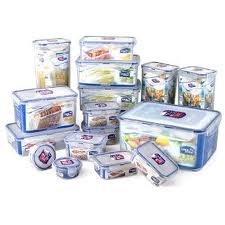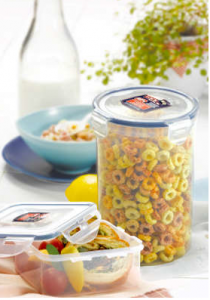
I’m sure we’re all aware of the benefits of a well-stocked pantry. It’s essential for menu planning organization, it helps maintain a diet full of real foods, and saves you a lot money by allowing you to stock up on foods when they hit their rock bottom price. (See our printable price list).
But if food is not stored properly it spoils and loses all value. That is why it is imperative to know the proper way to store pantry food & maximum shelf life.
The food wasted in the average North American kitchen is enormous. Way too much food (and money) are being thrown away! The numbers are shameful. Is your kitchen contributing to the problem? If so, I have some suggestions to help you save more and throw away less.
Food spoilage occurs when:
- Food is low quality and/or damaged when purchased.
- Food items are old, older, and embarrassingly old!
- Food is stored incorrectly, allowing for contamination to occur.
What damages food? Air. Heat. Cold. Light. Moisture. Smells. Tiny critters. Any of these factors could damage your hard-earned food but they can be prevented!
Ever since I discovered my entire stockpile overtaken with mice I have taken no chances with my pantry items. I kept my overflowing stockpile in our garage. What was I thinking? I had two tables stacked on top of one another and a blanket between the two and flowing down the back so they wouldn’t get scratched. We had dozens of tiny little mice in just about everything. It was so painful to throw away garbage bags of food. Thankfully, we have learned our lesson and now keep all food indoors.
I didn’t just stop at bringing food items indoors. In my home items are rarely left in their initial packaging and great care is taken to store them properly. I have became a fan of Lock & Lock bins and glass jars for storage. I don’t consider plastic bags or cardboard boxes effective for long term food storage. Thankfully we don’t have any rodents in our home but if we did it would be no problem for them to gnaw through cardboard. All dry ingredients need to live in a hard container like glass, hard plastic or metal and I use a combination of all three. These containers also help combat against moisture and air.
Here is what I do personally but you may have a different solution that works well for you.
Glass Jars
Most of my dry pantry items are stored in glass jars. So are a lot of fridge and freezer items, for that matter. They are a great option because they are inexpensive, recyclable, and airtight.
Food I store in glass jars: Tea bags, grains, legumes, seeds, nuts, dried herbs, pasta and more.
Plastic Storage Containers
My favorite storage container of choice is Lock & Lock. They are durable, airtight, and come in a variety of shapes and sizes to fit any food item. Some friends I know prefer Tupperware because they have a lifetime guarantee. Now, don’t quote me on that! This is just hearsay from my friends. : )
I label the outside of my containers with a cutout from the original package and cover with scotch tape. It’s not ultra classy but it gets the job done.
Food I store in Plastic Containers: Flours, sugars, cereal, pasta, chocolate, crackers, bread crumbs, oatmeal, pancake mix, and more.
Tins
Tins are ideal for containing small, easily scattered items like nuts or yeast packets. Tins also offer a dry, dark, and airtight space. The obvious drawback to tins is that you can’t see what is inside and I rarely use tins for food for this reason. For me, what’s out of site is out of mind with me and I’m not careful enough to make sure items don’t spoil.
Foods/items I store in tins: Coffee, dried chilies, yeast, gelatin, and more.
Pantry Items to Store in the Freezer
Several foods can be kept in the freezer to extend storage life, especially during the humid months.
- Flours
- Nuts
- Spices – especially ground spices
- Grains such as wheat germ and flax
- Seeds – sunflower, sesame, etc
- Vitamins (I don’t know if the freezer preserves them any better but it’s what my grandma always told me)
I’ve read that ground spices keep their condition and quality best when stored in an airtight container in the freezer.
Food for Thought: Share Your Bounty with Others
When so many people live daily around us with so little, we’re fortunate to have a stocked pantry. Don’t forget to share your extras with local shelters, food banks, or churches to help feed those in need around you.
Is there anything wasting away in your pantry right now?













Recent Comments